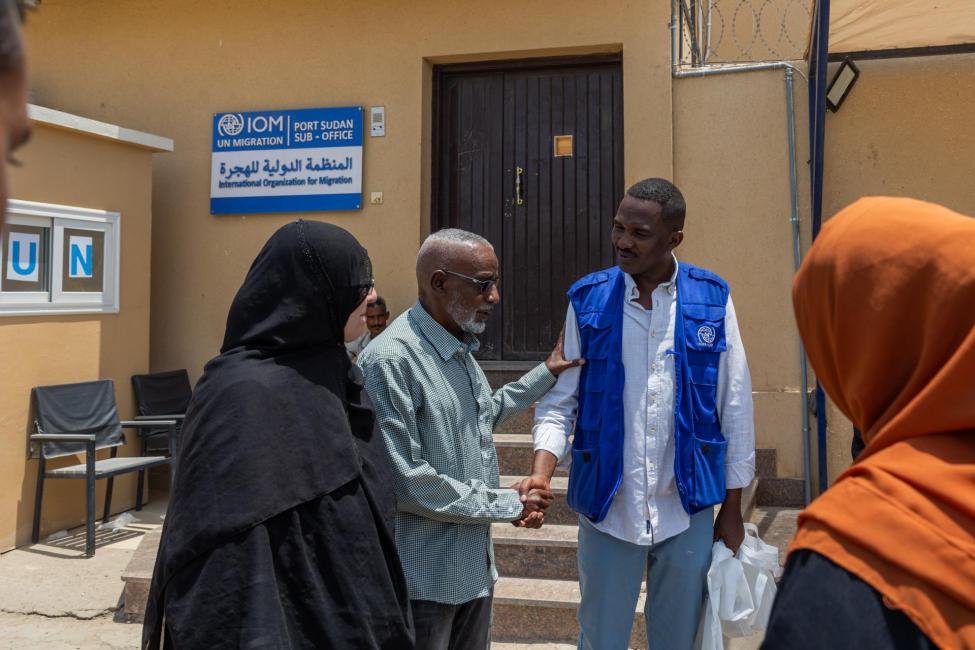-
Who We Are
WHO WE AREThe International Organization for Migration (IOM) is part of the United Nations System as the leading inter-governmental organization promoting since 1951 humane and orderly migration for the benefit of all, with 175 member states and a presence in over 100 countries. IOM has had a presence in Sudan since 1993.
About
About
IOM Global
IOM Global
-
Our Work
Our WorkAs the leading inter-governmental organization promoting humane and orderly migration, IOM plays a key role to support the achievement of the 2030 Agenda through different areas of intervention that connect both humanitarian assistance and sustainable development. Across Sudan, IOM provides a comprehensive response to the humanitarian needs of migrants, internally displaced persons, returnees and host communities.
Cross-cutting (Global)
Cross-cutting (Global)
- Data and Resources
- Take Action
- 2030 Agenda
In the early 1990s, Hashim, a Sudanese national, found himself in the chaos of war-torn Bosnia, where he dedicated his efforts to assist the affected population. He would never imagine that several decades later he would be caught up in a similar scenario.
During this turbulent time, he met Sevledina, a Bosnian woman whose resilience matched his own. They fell in love and got married. In 1997, less than a year after their marriage, they decided to continue their journey in Sudan.
"After living in Khartoum for two years, we moved to Wad Madani and lived there for 24 years," Sevledina recalls. "Before the war, it was peaceful and wonderful. We were happy."
Hashim ran a small transportation company in Madani, operating a fleet of taxis. Life seemed stable and promising. However, conflict erupted in April 2023 between the Sudanese Armed Forces and the Rapid Support Forces. "Khartoum was struck first," Sevledina recounted, her eyes distant with memories. "We thought it would not last long. But soon, it expanded to Madani."
"It was a Friday when Madani was attacked," she recalled. “Immediately after the first strike, we grabbed our children and a few belongings and begun running for safety, while bullets were flying over our heads.”
Their journey was fraught with peril. "We ended up on the streets, where we saw dead bodies lying on the road," Sevledina said, with a trembling voice. "We moved with large groups of people, all seeking safety. There were many large trucks transporting people. In each village we stopped, we would spend two to three days. It took us 15 days to reach Port Sudan." Once in Port Sudan, their hopes were ignited to reach safety through the support of the Bosnian Embassy and the International Organization for Migration (IOM). The family of Hashim and Sevledina is among 15 individuals that were supported to return to Bosnia under the Cooperation on Migration and Partnerships for Sustainable Solutions (COMPASS) initiative funded by the Ministry of Foreign Affairs of the Netherlands, which focuses on enhancing access to protection-sensitive pathways.
Time is running out for millions of people in Sudan who are at imminent risk of famine, displaced from their lands, living under bombardments, and cut off from humanitarian assistance. Half of Sudan’s population, nearly 25 million people are in dire need of humanitarian assistance; 14 million of those in need are children. The brutality of this conflict and its toll on vulnerable people is beyond belief. Hunger is rampant, and sexual violence is being used as a tool of war. Sudan has already become the world’s largest internal displacement crisis with over ten million Internally Displaced Person (IDP).
"Inshallah, I hope everything will be alright now," Sevledina said, her voice mixed with hope and determination.
As Bosnian nationals, they were eligible for assistance through IOM Voluntary Humanitarian Return (VHR) programme, which assists stranded migrants to return to their country. "We know that in Bosnia, we would need to begin rebuilding our lives from scratch. It won’t be hard for me to go back and I am glad my husband has Bosnian citizenship."
Eligibility for the VHR assistance includes fulfilling vulnerability criteria, possession of citizenship of the destination country, and a consent to return voluntarily.
Since the conflict escalated in Sudan, 670 stranded migrants were assisted through IOM VHR to reach home country. For voluntary returnees, IOM provides direct assistance, medical check-up, assists with processing paperwork, pocket money and purchasing flight tickets as well as provides escort and reintegration assistance upon return.





